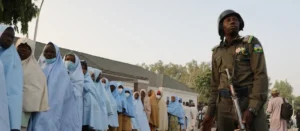
In northern Nigeria, certain communities are making payments to bandit groups in exchange for a semblance of peace. However, analysts warn that this approach could threaten the nation’s stability and integrity.
Along the Sokoto-Zamfara state border near the Nigeria-Niger frontier, the villages of Sabon Birni and Isa now lie deserted. In a bid to avoid a similar fate, some neighboring communities have attempted to broker peace deals with local bandit groups. These moves come after years of unsuccessful attempts by the Nigerian government to eliminate armed non-state actors who have continued to terrorize rural areas in Zamfara, Sokoto, and Katsina states.
Villagers who spoke with DW recounted harrowing stories of loved ones being kidnapped or killed. Their way of life — centered around farming sorghum, millet, and raising livestock for trade in nearby markets — has been severely impacted. As fields lie abandoned and harvests are stolen, families face mounting food insecurity. The broader impact is even more concerning: northern Nigeria, once considered the country’s agricultural backbone, is now struggling to meet its own food needs.
“We’ve been begging for peace. All we want is to live and farm without fear,” Suraju Mohammed from Sokoto told DW. “We can’t access our farms, and we’re forced to beg just to feed our families. Nothing matters more than peace,” he added.
‘No Other Choice’
Peacebuilding expert Dengiyefa Angalapu from the Lagos-based Centre for Democracy and Development describes the villagers’ situation as a reflection of “the failure of the social contract between the Nigerian government and its citizens.” Striking deals with violent non-state actors, he told DW, becomes “a rational survival strategy.”
“These communities know who these actors are. They’ll say, ‘I know his father, his mother — he grew up among us,’” Angalapu explained.
Farmers hoping to return to their land and provide for their families face the constant threat of abduction or are forced to pay levies imposed by these armed groups. With overlapping territories among various bandit factions, securing protection from one group — often in exchange for payments, fuel, or food — doesn’t guarantee safety from others who may not honor the agreement.
“We Just Want the Bloodshed to End”
“We support the deal because we want an end to the killings,” Suraju Mohammed told DW. “All we want is to live in peace.”
Calls to Strengthen State Authority
According to analysts and international observers, some regions of Nigeria are now effectively outside the government’s control — a situation that poses serious threats to national security.
“There is a growing presence of parallel governance,” Angalapu told DW. By negotiating with armed groups, communities may unintentionally grant them a sense of legitimacy, making it easier for these groups to recruit members.
“These gangs tell villagers, ‘We’re fighting for you. The government can’t protect you,’” he explained. “Over time, this narrative undermines state authority and poses a significant risk to long-term national security.”
No Real Choice for Villagers
At the local level, communities often have no real alternative, says Angalapu.
“It’s not that they support these peace agreements — it’s simply a matter of survival,” he told DW. “What’s urgently needed is to strengthen the state’s capacity to protect these communities.”
However, for people like Aisha Tukur from Zamfara State, the idea of negotiating with the bandits is unthinkable.
“They killed eight people in Turmi, four in Damne, three in Dauku. How can we make peace with that?” she asked. “There can be no reconciliation. They must be prosecuted. They’re heartless and ignore our cries.”
Ongoing Struggle Against Bandits and Insurgents
State governments have long been engaged in efforts to combat violent non-state actors. Yet mediation initiatives, de-radicalization programs, and even military responses — including patrols and airstrikes — have failed to deliver lasting peace.
Umaimah Abubakar, who fled the farming village of Ranganda, about 50 kilometers (31 miles) north of Sokoto city, now lives in an internally displaced persons (IDP) camp.
“The government hasn’t done much for us except pay ransoms when the bandits demanded it,” she told DW. “Even then, the bandits would return just a few months later.”
Bandit groups operate from camps hidden within a vast forest that stretches across Zamfara, Katsina, Kaduna, and Niger states. What began as local disputes between herders and farmers over land and resources has since escalated into a wider conflict, fueled by the influx of weapons linked to instability in the Sahel region. The violence is not only intensifying but also spreading beyond the northwest, with gangs becoming more heavily armed and better organized.
Compounding the crisis is the growing collaboration between criminal bandit groups—driven mainly by profit—and jihadist militants, who have been waging a separate insurgency in the northeast for over 16 years. This convergence has led to more frequent and deadly attacks. According to Western observers, bandit groups were responsible for more civilian deaths than jihadists between 2018 and 2023.